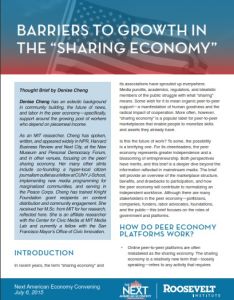Rejoignez getAbstract pour lire le résumé !

Rejoignez getAbstract pour lire le résumé !
Denise Cheng
Barriers to Growth in the "Sharing Economy"
2015
Aperçu
Sellers in the “peer economy” face a unique set of financial, regulatory and expertise barriers.
Recommendation
Popular online peer-to-peer platforms like Airbnb and Etsy allow users to generate income from their personal assets, skills and creativity. However, earning a wage using such platforms comes with its own problems. MIT researcher Denise Cheng provides an overview of the “peer economy” and discusses the advantages and barriers it poses. She suggests changes that the government and the platforms could implement to create a conducive business environment. getAbstract recommends her conclusions to policymakers, platform owners and independent contractors.
Summary
About the Author
Denise Cheng, an MIT researcher, has a background in community building, the future of news, and the workforce in the peer economy – specifically, support around the growing pool of workers who depend on piecemeal income.























Comment on this summary